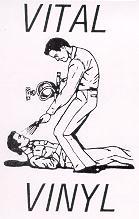
THE CLASH
Sandinista!
Epic
SIX SIDED CLASH
From Relix Magazine 1981
 |
How do you follow a double album that earned the highest accolades of any record by a British group in 1980 and even managed enough American sales to make Billboard’s top 25 LP’s?
The Clash think they have the answer with Sandinista! Believe it or not, this time they’ve given us a triple album! If you want to talk about being prolific there are 36 songs here - all new but one. And all this comes just one short year after London Calling’s reception gained British punk (or new wave) music the respectability it always deserved but never seemed to get on a large scale in the U.S.
But let loose over the space of six sides, the Clash seems a little lost for direction. The music on Sandinista! bears little resemblance to the initial burst of punk fury espoused in the anthems on their first album (many of which have scene become punk standards). The Clash that’s headed into 1981 is a band that’s trying to be too many different things to too many different people.
The most noticeable thing on first listening to Sandinista! is the amazing diversity of material to be found. Spread out over the space of more than two hours (!) of music some of the better songs (and there are some great ones on four of the six sides) tend to get a little lost. With a lot belt tightening this would have made a much better double album - though admittedly not up to the incredible standard of London Calling.
Still, if we’re going to look at this album with any sort of perspective, let’s see just what’s here one side at a time.
Side one includes several good moments. The opening "The Magnificent Seven" is the latest Joe Strummer manifesto - a rebel-rousing call-to-arms in LC tradition. But this time flavored with a wonderful sense of humor. "Hitsville U.K." takes a successful stab at commercial pop tune. Mick Jones duets with girlfriend Ellen Foley in a song detailing the growth of the independent record companies in England.
From here things tend to flag a bit until the side’s closer - "Something About England." This track offers another political history lesson from the Strummer/Jones point of view. Brass, vocalists singing "its a long way to Tipperary," and all sorts of strange things find their way into this veritable kitchen sink arrangement.
Side two also starts off on several slow notes. "Look Here" finds the Clash trying on their "cool jazz" shoes - while "The Crooked Beat" is a limp reggae workout that should have been forgotten. But things pick up with Mick Jones’ powerful "somebody Got Murdered" and Strummer’s anthemic "One More Time" (the latter featuring clash tour mate Mikey Dread) - a moving reggae tune that succeeds where the earlier track failed.
Side three opens with a funky soul strut in "Lightening Strikes," and moves directly into Mick Jones’ "Up In Heaven." The latter is one of the album’s very best tracks. Jones takes London’s slumlords to task in no uncertain terms to a pretty, mid-tempo melody whose flavor recalls Graham Parker’s Rumour. "Let’s go Crazy" offers up a Clash calypso tale of judicial corruption and ganja smuggling. This prepares us for the subtle transition to what lies ahead on the third disk - lots more reggae.
 |
| THE CLASH - Too Diverse? |
But first there’s side four. "Police On My Back" gives us a needed dose of trademark Clash-power! Mick Jones fast-fire riffling and the song’s wonderfully catchy melody insure this track a 45 release before too long. "Midnight Log" and "The Equaliser" are both weak tracks - the latter a limp reggae workout with violin (that’s right). Next up is the recent single "The Call Up" - an antidraft protest that features synthesizer, brass backing, glockenspiel and march rhythms. An O.K. tune - but not one of the group’s most inspired singles.
Still, just as things seem to be getting a little dull, up comes the stunning "Washington Bullets." This is the track that finally answers the question of just what the album’s title means. Sandinista! is a reference to the Nicaraguan freedom fighters who successfully toppled the dictatorial Somoza regime. Without even hitting the power switch, Strummer effortlessly relates the tale of these brave men to a light, marimba-filled arrangement.
If you’re still with us, the final disk as mentioned earlier, takes the clash where they seem to most enjoy going - Jamaica. Side five nonetheless opens with a folksy fiddle number ("Lose This Skin") sung by a female vocalist called Tymon Dogg (don’t ask me). From here it’s "Charlie Don’t Surf" (remember Robert Duvall on the beach in Apocalypse Now ?) - another pleasant but not particularly inspired light reggae ramble.
Articles Page
| London's Burning! Home PageArticle contribution by Anthony Peters
Send questions and comments to: jendave@lycosmail.com